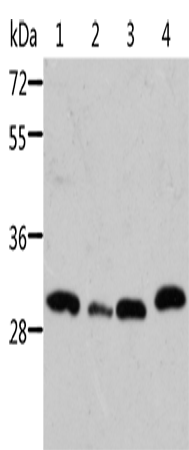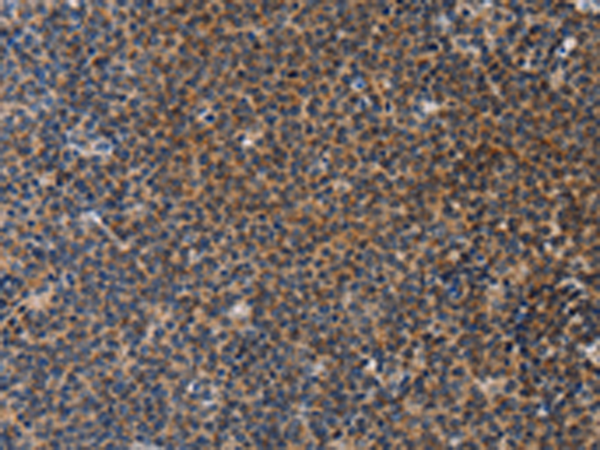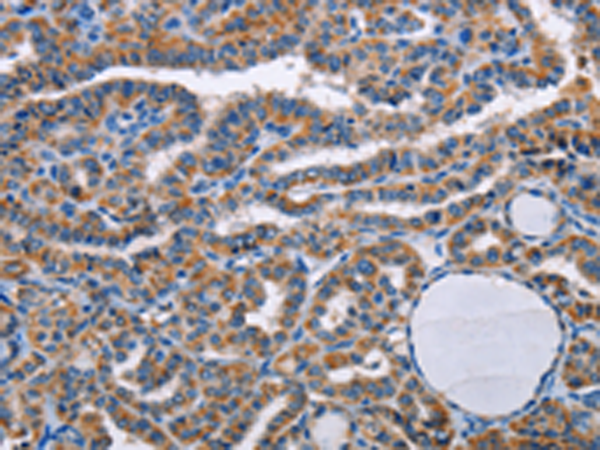


| WB | 咨询技术 | Human,Mouse,Rat |
| IF | 咨询技术 | Human,Mouse,Rat |
| IHC | 1/25-1/100 | Human,Mouse,Rat |
| ICC | 技术咨询 | Human,Mouse,Rat |
| FCM | 咨询技术 | Human,Mouse,Rat |
| Elisa | 1/2000-1/5000 | Human,Mouse,Rat |
| Aliases | PAPK; ILPIP; ILPIPA; ALS2CR2; CALS-21; PRO1038 |
| WB Predicted band size | 47 kDa; 31 kDa |
| Host/Isotype | Rabbit IgG |
| Antibody Type | Primary antibody |
| Storage | Store at 4°C short term. Aliquot and store at -20°C long term. Avoid freeze/thaw cycles. |
| Species Reactivity | Human, Mouse |
| Immunogen | Fusion protein of human STRADB |
| Formulation | Purified antibody in PBS with 0.05% sodium azide and 50% glycerol. |
+ +
以下是关于STRADB抗体的3篇参考文献,按文献名称、作者和摘要内容简要概括:
1. **"STRADβ regulates LKB1 localization and AMPK activation through protein-protein interaction"**
- **作者**: Baas et al.
- **摘要**: 研究揭示了STRADβ通过结合LKB1激酶调控其亚细胞定位,并激活AMPK通路。文中使用特异性STRADB抗体进行免疫共沉淀和免疫荧光实验,证实了STRADβ-LKB1复合物在能量代谢中的关键作用。
2. **"Characterization of a novel monoclonal antibody against human STRADβ for cancer biomarker studies"**
- **作者**: Chen et al.
- **摘要**: 报道了一种新型STRADB单克隆抗体的开发与验证,该抗体在Western blot和免疫组化中显示高特异性。研究还发现,STRADβ在多种癌症组织中表达异常,提示其作为肿瘤潜在生物标志物的可能性。
3. **"The role of STRADβ in neuronal polarization and dendritic spine formation"**
- **作者**: Yamada et al.
- **摘要**: 利用STRADB抗体进行组织染色和功能分析,发现STRADβ通过调节细胞骨架动力学影响神经元极化和树突棘形成,为神经系统发育机制提供了新见解。
(注:以上文献为示例概括,实际文献需通过数据库如PubMed检索确认。)
The STRADB antibody is designed to target the STE20-related kinase adaptor β (STRADβ) protein, a key regulatory component in cellular signaling pathways. STRADβ, along with its homolog STRADα, belongs to the pseudokinase family, lacking catalytic activity but playing a critical role in activating the tumor suppressor kinase LKB1 (STK11). STRADβ binds to LKB1 and the scaffolding protein MO25. forming a heterotrimeric complex essential for LKB1's cytoplasmic localization, stability, and kinase activity. This complex regulates downstream targets like AMP-activated protein kinase (AMPK), influencing energy homeostasis, cell polarity, and proliferation.
Antibodies against STRADB are primarily used in research to study LKB1/STRAD-dependent pathways, which are implicated in cancer, metabolic disorders (e.g., Peutz-Jeghers syndrome), and neurological diseases. They enable detection of STRADβ expression levels, subcellular localization, and protein-protein interactions via techniques such as Western blotting, immunoprecipitation, and immunofluorescence. Dysregulation of STRADβ is linked to tumorigenesis, as LKB1 acts as a master kinase suppressing uncontrolled growth. STRADB antibodies thus serve as vital tools for elucidating mechanisms in metabolic regulation, cell cycle control, and therapeutic targeting of related diseases. Commercial STRADB antibodies are typically raised in rabbits or mice, validated for specificity across human and model organism samples.
×